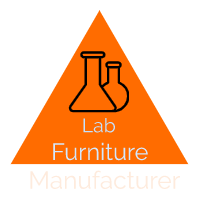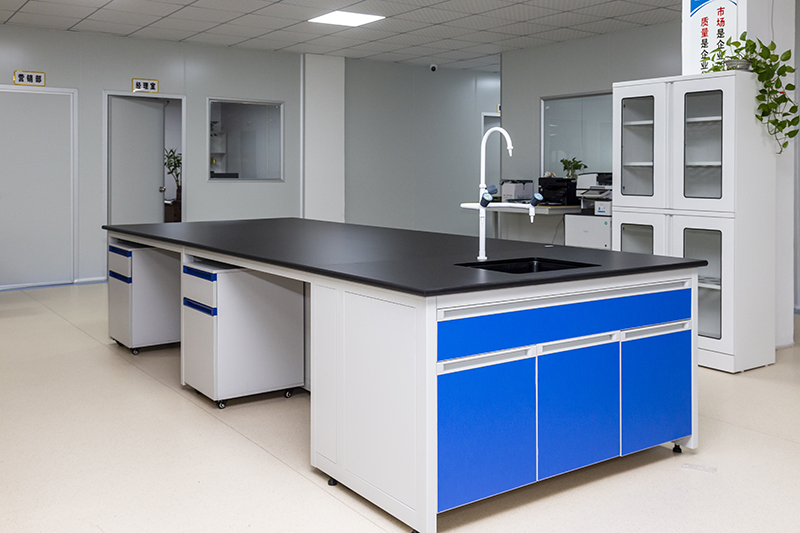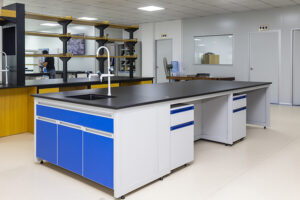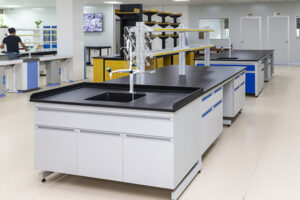Choosing the right lab workbench top is one of the most critical decisions when furnishing a laboratory. There are many factors to consider, such as the type of chemicals used, the workbench size, and the budget.
This blog post will explore the different types of laboratory bench tops and how to choose the right one for your laboratory.
Basic Types of lab Workbenches:
Various lab workbenches are available on the market today, and every kind of workbench is designed for a specific type of work or lab environment. Epoxy resin is the best and most common surface material for lab workbench. Here we will briefly discuss the different lab workbench types and their professional uses.
The most common type of lab workbench is the lab table without storage. It is often used as a regular lab table or equipment table to keep instruments on or as a place to set equipment.
Another common type of lab workbench is the mobile workbench. They usually are lab tables with drawers designed to move around quickly.
The third type of lab workbench is the wall-mounted lab workbench. This workbench is mounted to a wall and often used in small spaces or labs where space is limited. These types of benchtops usually come with shelves. The best thing about Lab benches with frames is that they provide greater flexibility.
A Lab island table is also the most used type of lab workbench made of metallic material, and it is ergonomically constructed and resistant to any chemical and abrasion product.
A laboratory table with a sink is another essential type of lab bench furniture to work on and is perfect for science experiments.
But these types are only the tip of the iceberg as we’ll dive deep into different domains and see what kind of benches and materials they prefer for their daily work adventure. Read on to learn more.
Types of Materials used to make lab workbench.
Phenolic Resin
A phenolic resin workbench is a great choice when setting up a lab where a contamination-free environment is a top priority. Lab workbench tops made with phenolic resin are durable due to their resistance to moisture, fungus, chemicals, and germs. It is safe to say that they are chemical lab tables that are light and long-lasting.
Epoxy Resin
The epoxy resin lab workbench is also durable and stylish and provides a clean look to any laboratory. That’s it is the most preferred option when it comes to lab workbench. Best of all, bench tops made with epoxy resin are non-porous, which means they are resistant to moisture, heat, and chemicals. That’s why they are ideal for usage in high-contaminant and high moisture spaces. In addition, these chemical-resistant lab tables can be used around sinks.
Stainless Steel
Heavy-duty stainless steel lab furniture is another sleekest choice that is insanely durable. Stainless steel is best known for its cleanability. Moreover, it doesn’t support microbes and germs in the long term. It is available in two varieties, i.e., polished and brushed, and you don’t clean brushed stainless steel more efficiently than polished.
High-Pressure Plastic Laminate
High-pressure plastic laminate is the most affordable surface material for making a lab workbench. Melamine, phenolic resin, and wood fibers make the plastic laminate. A workbench top with high-pressure plastic laminate is an excellent option for dry working conditions, such as in technology labs.
Ceramic
Ceramics is considered the best surface material due to its waterproof property. In addition, this luxurious material is non-porous that is stain resistant as it prevents absorption.
Polypropylene
Polypropylene is another excellent choice for chemical labs due to its resistance to most solvents, especially chemicals. It is highly resistant to acid, base, and chemicals because it is a thermoplastic polymer. In addition, polypropylene lab workbench tops offer moderate to high chemical and water resistance levels. So this surface material is ideal for labs where corrosive materials are used.
Edge-Grain Maple
Edge-grain maple, also commonly known as butcher block, can be used in any lab environment where chemicals are not a big concern. Maple planks create around two inches thick tops that repel alcohol and are suitable for biological and food labs.
Granite
Granite is a natural stone that is extremely strong and durable, and it is also non-porous, which means it is resistant to spills, chemicals, and stains. So workbench tops made with granite can be called chemical-resistant tables Granite workbench tops are an excellent choice for any professional industry where durability and easy maintenance are a high priority.
Requirements to choose workbench top for the different lab work environment
When choosing the proper workbench for your lab, the most critical question you should ask yourself is what type of work you will perform at this lab workbench. This question will tell you what to consider when choosing the right lab workbench. First, let’s explore what to consider when selecting the workbench for the different lab environments.
Labs where experiments require working with water, such as biology labs, need wet lab furniture. This way, you can easily access tap water. So always choose the workbench with sink, reagent rack, and water faucet for the biology lab.
In lab environments dealing with high temperatures, chemicals, glassware, and wet condition, opt for a sturdy surface material that can withstand these conditions.
Dry lab workbenches are the best choice in laboratories where electrical connections and open space are required. For instance, a flat workbench with storage is the best option in a physics lab, where no high heat and corrosion chemical is involved.
It would help to choose a chemical resistance workbench for labs where heavy chemical testing is performed, like pharmaceutical labs. Epoxy resin and stainless steel are the most commonly used surface material to ensure durable use.
In hospital labs where non-contamination is the top priority for best results, you should choose a workbench that can handle constant cleaning and high temperature.
What type of lab workbench top is used in different industries, and how to choose it?
The top of a lab workbench is one of the most important aspects to consider when designing your laboratory. The material you choose for your top will impact your space’s overall function and look. Here we will explore the different kinds of lab furniture available on the market and help you choose the best one for your needs.
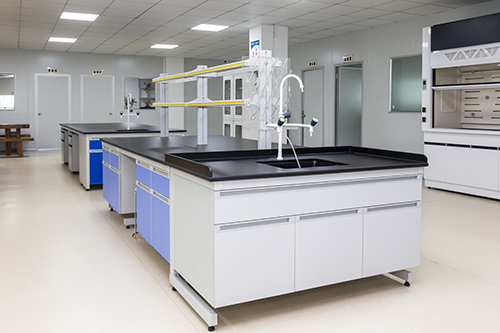
Pharmaceutical Industry
Epoxy Resin workbench top (specifications and how to choose it)
When selecting a workbench top for your laboratory, there are many factors to consider. But one of the most important is the material the workbench is made from. Epoxy resin is a popular choice for laboratory workbenches, especially in the pharmaceutical industry. Here’s a look at the benefits of epoxy resin and how to choose the right one for your needs.
Epoxy resin is a strong and durable material that can withstand high temperatures and chemicals, and it’s also easy to clean and sterilize, which is essential in a laboratory setting. In addition, epoxy resin workbenches are available in various colors, so you can choose one that matches your lab’s décor.
When choosing an epoxy resin workbench, you need to consider the weight capacity and height. For example, if you’re using heavy equipment on the workbench, ensure it can support the weight. And if you’re tall, ensure the workbench is high enough to reach all areas comfortably.
Finally, read the manufacturer’s instructions before installing or using an epoxy resin workbench. This will help ensure you get the best results and avoid damaging yourself or the goods.
Stainless Steel workbench top
As most people related to the field are aware that the pharmaceutical industry is highly regulated, you also know that your workbench top needs to be made of stainless steel. But what kind of stainless steel? There are many types and grades of stainless steel, each with its properties. So how do you choose the right one for your workbench top?
Three main types of stainless steel are austenitic, ferritic, and martensitic.
Austenitic steels are non-magnetic and have high levels of chromium and nickel. They are the most popular stainless steel type used in food processing, chemical processing, and medical equipment.
Ferritic steels are magnetic and have low levels of chromium. They are often used in automotive applications.
Martensitic steels are magnetic and have high levels of carbon. As a result, they are complex and robust but can be brittle.
The most common grade of austenitic stainless steel is 304, which contains 18% chromium and 8% nickel. It is also known as 18/8 stainless steel. Stainless steel is weak in resistance to corrosion from most chemicals and is often used in food processing equipment, kitchen utensils, and more.
Biotechnology Company’s Lab
•Phenolic Resin workbench top
Are you working in a biotechnology company’s lab? If so, you know that a phenolic resin workbench top is the way. It’s easy to clean and sterilize, which is critical in this industry. Plus, it’s durable and will stand up to repeated use.
•Epoxy Resin workbench top
A biotechnology company’s lab must have a workbench top that can stand up to solid chemicals and heat. Phenolic resin workbench tops are one option that can provide this type of protection. This material is also easy to clean and sterilize, which is essential in a lab setting.
Educational Lab for student
•Epoxy Resin workbench top
When choosing a lab workbench top, it’s important to remember the type of work that will be performed. For example, working with chemicals or other corrosive substances, you’ll need a top resistant to those substances. Epoxy resin board workbench tops are a good choice for this type of work, as they are highly resistant to chemicals and won’t rust over time.
Physics lab
•High-Pressure Laminate Countertop
If you are looking for a lab workbench top that can withstand high temperatures and pressures, then a high-pressure laminate countertop is the way to go. This type of physics lab table is made from multiple layers of laminate fused under high pressure and heat. This results in a highly durable countertop and is resistant to scratches, stains, and burns.
Hospital Lab
•Epoxy Resin workbench top
If you work in a hospital lab, you will want to choose an epoxy resin workbench top. This top type is straightforward to clean and maintain and resistant to many chemicals.
•Stainless Steel workbench top
If you work in a hospital lab, you want a stainless steel workbench top. This workbench top is easy to clean and sterilize, which is essential in a hospital setting. Stainless steel is also durable to stand up to heavy use daily in a hospital lab.
Animal Sciences Lab
•Epoxy Resin
Animal sciences students will find this epoxy resin workbench top a valuable addition to their lab. The biology lab table is made of a durable material that is easy to clean and maintain. It is also scratch-resistant, making it ideal for a busy lab setting.
Plant science lab
•Phenolic Resin
Phenolic resin is a type of plastic often used in laboratory settings due to its durability and resistance to chemical damage. A phenolic resin workbench top is an ideal surface for animal science experiments that require a rugged, non-porous work surface.
Chemical resistant table made of phenolic resin is also easy to clean and disinfect, which is essential in a laboratory setting. Therefore, when choosing a phenolic resin workbench top for your animal science experiments, select a product specifically designed for use in a laboratory setting. These products are usually clearly marked and have a higher weight capacity than standard phenolic resin products.
•Epoxy Resin
A Phenolic Resin Workbench Top is an excellent addition to any Plant Science Lab. This science lab bench is highly resistant to heat, chemicals, and solvents, making it the perfect surface for working with these materials. Phenolic resin is also very easy to clean, so you can keep your workspace looking pristine.
If you are looking for a workbench top that will withstand even the most strenuous use, a Phenolic Resin Workbench Top is the way to go.
Disease Control Center Lab
•Epoxy Resin
Epoxy resin workbench tops are ideal for disease control center labs because they provide a smooth, non-porous surface that is easy to clean and disinfect. Epoxy resin is also resistant to various chemicals, making it ideal for use in a lab setting.
If you plan to outfit a disease control center lab with an epoxy resin workbench top, there are a few things to remember.
First, purchase a workbench top explicitly made for use in a lab setting. These workbench tops are often reinforced with steel or aluminum to provide additional strength and durability.
Second, be sure to have the workbench top installed by a professional, ensuring that it is adequately sealed. Additionally, all of the necessary precautions are taken to protect the people who will be using the lab.
Environmental Test and Inspection Lab
•Epoxy Resin Workbench top
An epoxy resin workbench top is an excellent addition to any workspace. This science lab bench is durable, easy to clean, and can be customized to fit your specific needs. But how do you choose the right epoxy resin workbench top for your needs?
Here will discuss the various aspects of epoxy resin workbench tops, including the different types of epoxy resin, the benefits of an epoxy resin workbench top, and how to choose the right epoxy resin workbench top for your needs.
Type of epoxy resin: Solid and liquid are two main types. Solid epoxy resin is the most common type of epoxy resin and is typically used for countertops, floors, and other surfaces that need to be durable. Liquid epoxy resin is less common and is typically used for projects that require a high level of detail.
Benefits of an epoxy resin workbench top: Epoxy resin is known for its durability, easy maintenance, and customization ability. An epoxy resin workbench top can be used in a variety of settings and can be customized to fit your specific needs. Epoxy resin is also resistant to scratches, stains, and heat, making it an ideal choice for countertops, floors, and other surfaces that need to be durable.
How to choose the right epoxy resin workbench top for your needs: When choosing an epoxy resin workbench top, you must consider the type of project you plan on using it for. Solid epoxy resin is the best choice if you plan on using it for a countertop or floor.
How to Choose the Perfect Workbench for Your Lab?
Most people think of workbenches as a place to store tools and perhaps as a place to do light work. However, in professional industries, workbenches serve a much more critical purpose. For example, a well-designed workbench can make a huge difference in science labs.
There are dozens of different lab workbenches available on the market today. So, how do you know which one is right for you and your professional domain? Here are a few things to keep in mind when choosing the perfect workbench for your needs:
– First, consider the type of work in the lab you’ll be doing. For example, if you’re a chemist, you’ll need a different lab workbench than someone who works with electrical and electronic equipment.
– Next, think about the size of the workbench. You’ll need to ensure it’s large enough to accommodate all of your equipment but not so large that it takes up too much space in your work area.
– Finally, think about your budget. Lab Workbenches can range in price from a few hundred dollars to a few thousand, so you’ll need to decide how much you’re willing to spend.
The bottom Line
In many laboratories, the workbench top is one of the essential pieces of equipment, and it must be able to withstand spills and heat and be easy to clean. But with so many different materials on the market, how do you choose the right one for your laboratory?
Well, the above text covered it all. We hope this read helps you make the right option on the laboratory bench-top. If you are looking for a lab workbench, welcome to contact Johnson to give professional advice.
